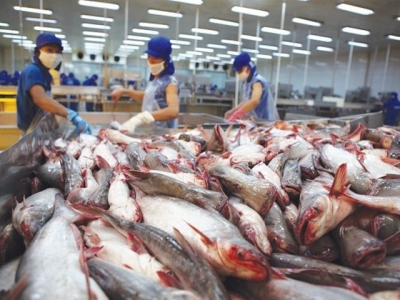Tra fish exporters pin high hopes on EVFTA

Despite Vietnam's Tra fish (pangasius) exports to markets and the EU in particular still facing numerous difficulties due to the impact of the COVID-19 pandemic, Tra fish exporters have great hopes for quick recovery from exports to the EU after the pandemic by taking full advantage of the EU-Vietnam Free Trade Agreement (EVFTA).
According to the Vietnam Association of Seafood Exporters and Producers (VASEP), the first half of August saw the total value of Tra fish exports to the EU reach US$85.55 million, down 34.1% over the same period last year. Indeed, the export value to some other markets such as the Netherlands, Germany, and Spain also endured a sharp decline.
Although the EU is still the third largest pangasius export market of Vietnamese seafood enterprises, after China and the US, there has been no sign of recovery in exports of this product to this highly lucrative market so far.
The major cause is largely attributed to disrupted trade activities as many European nations were at the epicenter of the pandemic, including two major countries- Italy and Spain, the VASEP notes.
Following the enforcement of the EVFTA as from August 1, many Vietnamese catfish businesses expect a breakthrough in export activities to this potential market when two main catfish products- fresh and chilled catfish, and whole frozen catfish enjoy basic tax reduction from 8% to zero%.
Fresh, chilled catfish is reduced tax rate from 9% to 0% after 3 years while frozen fillet catfish falls tax from 5.5% to 0% after 3 years of EVFTA’s effect. In addition, other processed catfish products also enjoy tax reduction from 14% to 0% in three years.
The sharp tax reduction will help increase the competitive advantage of Vietnamese catfish in the EU market compared to other native white fish products which are not subject to import tax.
However, according to VASEP, most catfish businesses have not been able to capitalize on the EVFTA as a result of the complicated developments of the pandemic.
Currently, many businesses are still striving to resume orders step by step, plan farming areas, and issue certificates according to EU market standards as a means of achieving the better EU market penetration after the pandemic is brought under full control.
Related news
 Why floating closed containment aquaculture could be dead in the water
Why floating closed containment aquaculture could be dead in the water The dream of operating floating closed containment aquaculture systems at sea is at risk of becoming “a dead case” in Norway, due to regulatory constraints.
 Could a forage crop replace forage fish in aquafeeds?
Could a forage crop replace forage fish in aquafeeds? Feed pellets made from the protein-rich leave of alfalfa are proving popular in feed trials currently being conducted in the US.
 A saline solution for aquaculture and agriculture
A saline solution for aquaculture and agriculture Using sea water to create coastal wetlands in which crops including fish and shellfish can be grown is a relatively new concept